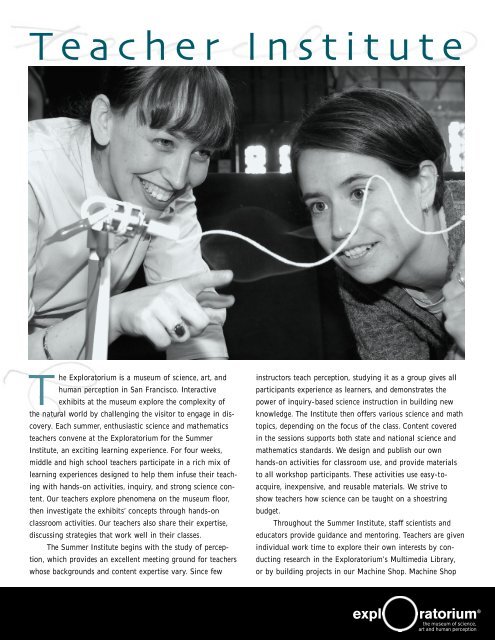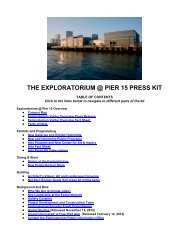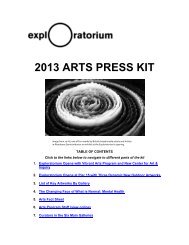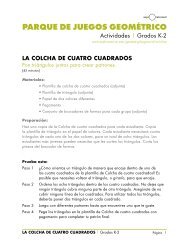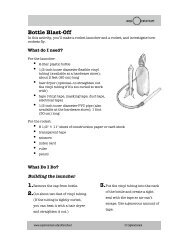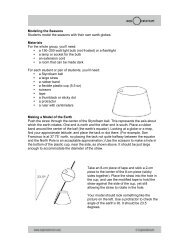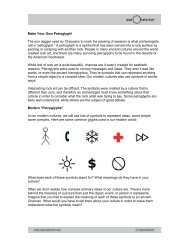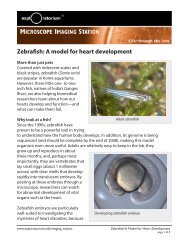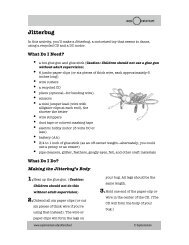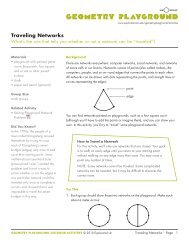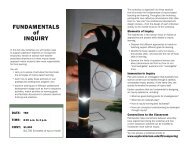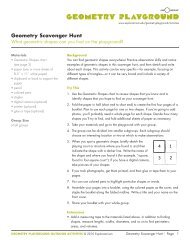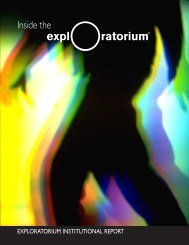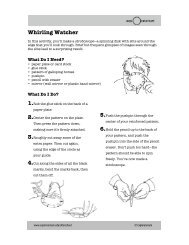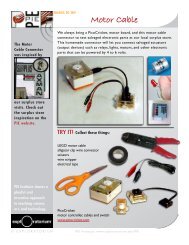expl r a t o r i u m - Exploratorium
expl r a t o r i u m - Exploratorium
expl r a t o r i u m - Exploratorium
Create successful ePaper yourself
Turn your PDF publications into a flip-book with our unique Google optimized e-Paper software.
he <strong>Exploratorium</strong> is a museum of science, art, and<br />
human perception in San Francisco. Interactive<br />
exhibits at the museum <strong>expl</strong>ore the complexity of<br />
the natural world by challenging the visitor to engage in dis-<br />
c o v e r y. Each summer, enthusiastic science and mathematics<br />
teachers convene at the <strong>Exploratorium</strong> for the Summer<br />
Institute, an exciting learning experience. For four weeks,<br />
middle and high school teachers participate in a rich mix of<br />
learning experiences designed to help them infuse their teach-<br />
ing with hands-on activities, inquiry, and strong science con-<br />
tent. Our teachers <strong>expl</strong>ore phenomena on the museum floor,<br />
then investigate the exhibits’ concepts through hands-on<br />
classroom activities. Our teachers also share their expertise,<br />
discussing strategies that work well in their classes.<br />
The Summer Institute begins with the study of percep-<br />
tion, which provides an excellent meeting ground for teachers<br />
whose backgrounds and content expertise vary. Since few<br />
instructors teach perception, studying it as a group gives all<br />
participants experience as learners, and demonstrates the<br />
power of inquiry-based science instruction in building new<br />
knowledge. The Institute then offers various science and math<br />
topics, depending on the focus of the class. Content covered<br />
in the sessions supports both state and national science and<br />
mathematics standards. We design and publish our own<br />
hands-on activities for classroom use, and provide materials<br />
to all workshop participants. These activities use easy-to-<br />
acquire, inexpensive, and reusable materials. We strive to<br />
show teachers how science can be taught on a shoestring<br />
b u d g e t .<br />
Throughout the Summer Institute, staff scientists and<br />
educators provide guidance and mentoring. Teachers are given<br />
individual work time to <strong>expl</strong>ore their own interests by con-<br />
ducting research in the <strong>Exploratorium</strong>’s Multimedia Library,<br />
or by building projects in our Machine Shop. Machine Shop<br />
®<br />
<strong>expl</strong> r a t o r i u m<br />
the museum of science,<br />
art and human perception
A teacher merges his face with a colleague's in a “snack"-sized version of a larger <strong>Exploratorium</strong> exhibit called Your Father's Nose.<br />
The teacher plans to use this “snack" in his science classroom.<br />
instructors, who are schoolteachers themselves, assist teachers<br />
in designing projects and learning how to use power tools.<br />
L a t e r, participants practice teaching techniques by presenting<br />
their projects and research results to colleagues.<br />
Following the Summer Institute, our alumni are invited<br />
to attend Saturday sessions during the academic year. These<br />
sessions focus on single topics that are always <strong>expl</strong>ored<br />
through hands-on investigation and group activities. Alumni<br />
can also return for special two-week advanced institutes<br />
offered during subsequent summers. Many alumni have been<br />
active participants in our workshops for over ten years. In<br />
this way, our program is unique: We provide teachers with<br />
opportunities for both giving and receiving support through-<br />
out their professional lives.<br />
Summer Institute Schedule<br />
The Summer Institute is a four-week intensive program for<br />
middle and high school science and mathematics teachers.<br />
Workshops are offered throughout the summer from mid-June<br />
through mid-July. Classes meet Monday through Friday.<br />
Teachers can select morning sessions (8:30 a.m. to 2:00 p.m.)<br />
or afternoon sessions (12:00 noon to 5:30 p.m.). Teachers can<br />
also select workshops that focus on life sciences, physical<br />
sciences, or mathematics at either the middle or high school<br />
level. After completing the Summer Institute, teachers are<br />
paid a stipend of $1100 and become Teacher Institute alumni.<br />
Applications for the Summer Institute are sent in mid-<br />
February to individuals and selected schools. Interested teach-<br />
ers can e-mail annar@<strong>expl</strong>oratorium.edu or call (415) 561 -<br />
0 313 to get on the application mailing list. The deadline for<br />
applications is April 15. Participants are notified of their<br />
acceptance status during the first week of May.<br />
Teacher in Residence (T I R )<br />
The <strong>Exploratorium</strong> Teacher Institute invites alumni of our<br />
program to take a sabbatical from their classroom teaching to<br />
work with the Institute as a Teacher in Residence (TIR).<br />
During their residencies, TIRs can participate in exhibit build-<br />
ing, teach in our professional development workshops, and<br />
visit local schools to model lessons for teachers. TIRs also<br />
offer assistance to school districts throughout the San<br />
Francisco Bay Area by organizing and leading district profes-<br />
sional development days and providing in-class coaching.<br />
Ex p l o rato rium Teaching Resource s<br />
Teacher Institute Publications<br />
The Teacher Institute staff has produced several science<br />
and mathematics publications that are excellent classroom<br />
resources. The <strong>Exploratorium</strong> Science Snackbook Series pro-<br />
vides “recipes" for creating small, inexpensive versions of the<br />
<strong>Exploratorium</strong>’s most popular exhibits. The latest book in this<br />
series, Square Wheels and Other Easy-to-Build, Hands-On
Two teachers discover the path of blood flow through the chambers<br />
and vessels of a sheep heart.<br />
Science Ac t i v i t i e s , contains thirty-one of these projects. Other<br />
books include Math and Science Across Cultures, with cre-<br />
ative experiments featuring games, art, music, and everyday<br />
activities from around the world. Human Body Explorations:<br />
Hands-on Investigations of What Makes Us Tick, c o n t a i n s<br />
twenty-eight activities enabling learners to discover how their<br />
bodies function on microscopic and macroscopic levels. M a t h<br />
E x p l o r e r provides a variety of engaging, hands-on activities<br />
for middle school students, and the Science Explorer s e r i e s<br />
presents enriching projects for parents and children, ages<br />
6 – 10, to do at home. Traces of Time: The Beauty of Changes<br />
in Nature and The Color of Nature both contain stunning<br />
color photographs and lively text that encourage readers to<br />
observe and discuss nature in a completely different way. All<br />
of these publications are available at the <strong>Exploratorium</strong> Store<br />
or online at www. e x p l o r a t o r i u m . e d u / s t o r e .<br />
Ex p l o rato rium Le a rning St u d i o<br />
The <strong>Exploratorium</strong> Learning Studio offers further support for<br />
teaching science and mathematics by maintaining an exten-<br />
sive collection of books, journals, and videos. Alumni of the<br />
Teacher Institute can borrow materials at any time. Browse t h e<br />
Learning Studio catalog online at www.<strong>expl</strong>oratorium.edu/ls.<br />
Other educators may borrow materials by purchasing an<br />
"Educator Membership" from the <strong>Exploratorium</strong> at<br />
w w w. e x p l o r a t o r i u m . e d u / m e m b e r s h i p .<br />
Web Sites<br />
The Teacher Institute’s Web site at www.<strong>expl</strong>oratorium.edu/ti<br />
contains information about our program as well as classroom-<br />
tested activities we have developed. Alumni of the Teacher<br />
Institute can engage in online conversation on the Teacher<br />
Institute listserv, Pinhole. Teachers provide resource informa-<br />
tion, present questions students have asked, discuss science in<br />
current events, and suggest activities. Access to Pinhole is<br />
given to all Teacher Institute participants.<br />
The <strong>Exploratorium</strong> maintains an extensive collection of<br />
online educational science and mathematics resources at<br />
www.<strong>expl</strong>oratorium.edu. You’ll find articles on science con-<br />
tent, descriptions of hands-on activities developed by the<br />
<strong>Exploratorium</strong>, live Webcasts from science laboratories around<br />
the world, online exhibits, and links to other exemplary science<br />
education Web sites. The Web site’s digital library allows you<br />
to search through archives of thousands of <strong>Exploratorium</strong> Web<br />
pages. Log on to www.<strong>expl</strong>oratorium.edu/educate and find fur-<br />
ther “Tools for Teachers," including links to the Teacher<br />
Institute and the Learning Studio, and information about<br />
programs for students.<br />
Webcasts and The Iron Science Teacher<br />
The <strong>Exploratorium</strong> periodically creates live Webcasts, including<br />
the very popular Iron Science Teacher, a take-off of the<br />
Japanese TV series Iron Chef. Iron Science teacher participants<br />
During an Iron Science Teacher Webcast, a young audience member<br />
assists a teacher, who is participating in the Summer Insitute.
Flowers evolved for one purpose—reproduction. Teachers compare and contrast the parts of a variety of blooms.<br />
build science activities based on a secret ingredient, using sim-<br />
ple materials, and present these activities to both a live audi-<br />
ence and a virtual audience over the Internet. See the archives<br />
at www.<strong>expl</strong>oratorium.edu/ironscienceteacher.<br />
Field Trips<br />
A field trip to the <strong>Exploratorium</strong> can be an integral part of a<br />
science curriculum and a valuable addition to classroom work<br />
in many subjects. Field trips are by reservation only, 10 a.m. to<br />
4 p.m. Plan your field trip early; spring slots fill up fast. For<br />
reservations, call (415) 561-0317.<br />
<strong>Exploratorium</strong> Store<br />
The <strong>Exploratorium</strong> Store stocks a wide range of science and<br />
activity books, posters, and educational toys. Visit the Store in<br />
person or online at www.<strong>expl</strong>oratorium.edu/store.<br />
Teacher Institute Staff<br />
Tory Brady, Coordinator Leadership Program, Staff<br />
Teacher<br />
Paul Doherty, Co-Director, Senior Scientist<br />
Karen Kalumuck, Staff Biologist<br />
Lori Lambertson, Coordinator Beginning Teacher Program,<br />
Staff Teacher<br />
Eric Muller, Staff Teacher<br />
Don Rathjen, Staff Teacher<br />
Steve Ribisi, Biology Post-Doc<br />
Anna Rochester, Program Manager<br />
Linda Shore, Director, Staff Physicist<br />
Modesto Tamez, Coordinator Leadership Program, Staff<br />
Teacher<br />
Blake Wigdahl, Project Coordinator<br />
<strong>Exploratorium</strong> Teacher Institute<br />
3601 Lyon Street<br />
San Francisco, CA 94123<br />
Teacher Institute: (415) 561-0313<br />
<strong>Exploratorium</strong>: (415) 563-7337 FAX (415) 561-0307<br />
E-mail: annar@<strong>expl</strong>oratorium.edu, Program Manager,<br />
Teacher Institute<br />
www.<strong>expl</strong>oratorium.edu/ti<br />
The <strong>Exploratorium</strong> Teacher Institute is generously funded by<br />
the National Science Foundation, The Noyce Foundation, the<br />
Carnegie Corporation of New York, The Walter and Elise Haas<br />
Fund, The Arthur Vining Davis Foundations, Wells Fargo, and<br />
Bank of America.
he <strong>Exploratorium</strong> Teacher Institute (TI) has been<br />
offering workshops in content and pedagogy to<br />
middle and high school science teachers since 1984.<br />
Our mission is to help these teachers infuse their classes with<br />
hands-on activities, scientific inquiry, and strong content.<br />
Teachers who participate in the four-week introductory<br />
Summer Institute return to the <strong>Exploratorium</strong> as Teacher<br />
Institute alumni for ongoing professional development<br />
throughout their careers. The Teacher Institute is now a profes-<br />
sional home to well over 2,000 alumni—many have been active<br />
participants for over ten years.<br />
In 1998, the Teacher Institute noticed a sharp increase in<br />
the number of beginning science teachers applying to our<br />
Summer Institute. We also found that many of our most expe-<br />
rienced alumni were retiring from classroom teaching, yet were<br />
eager to help other teachers and continue their association with<br />
the <strong>Exploratorium</strong>.<br />
We took the opportunity presented by the “changing of<br />
the guard" to create a two-year program for novice science<br />
teachers (TI Beginning Teacher Program) and another two-year<br />
program designed to train and support a group of experienced<br />
TI alumni who would serve as their mentors (TI Leadership<br />
Program). The programs make up the <strong>Exploratorium</strong> Teacher<br />
Induction Program. The primary goal of the program is to sup-<br />
port, retain, and develop the next generation of science teach-<br />
ers, while also inducting them into the larger community of<br />
exemplary teachers who make the <strong>Exploratorium</strong> Teacher<br />
Institute their professional home.<br />
Beginning Teacher Program<br />
Beginning science teachers at the middle and high school level<br />
are a diverse group with varying needs. Some are recent gradu-<br />
ates of teacher-education programs, while others are still work-<br />
ing on their credentials. Some have strong science backgrounds,<br />
whereas others have a more limited understanding of content.<br />
Because beginning science teachers differ so greatly in back-<br />
ground and need, the TI Beginning Teacher Program offers par-<br />
ticipants a wide variety of content workshops, support-group<br />
meetings, teaching seminars, and in-class coaching sessions<br />
from which to choose. With the guidance of <strong>Exploratorium</strong> staff<br />
and experienced science teachers (who are also active partici-<br />
pants in Teacher Institute programs) serving as their mentors,<br />
beginning teachers tailor the program to meet their unique<br />
needs.<br />
Each fall, about thirty beginning science instructors who<br />
teach in the San Francisco Bay Area start the two-year support<br />
program. Novices are required to attend four science-content<br />
workshops, a minimum of four teaching seminars, and a mini-<br />
mum of four support-group meetings each year. New teachers<br />
also receive classroom visits by experienced science teachers<br />
<strong>expl</strong> r a t o r i u m<br />
®<br />
®<br />
the museum of science,<br />
art the and museum human perception of science,<br />
art and human perception
A teacher joyfully builds a zoetrope during an animation<br />
workshop.<br />
(either on sabbatical or retired from teaching), who coach them<br />
as they lead hands-on, inquiry-based activities.<br />
After the first academic year, all novices attend the<br />
Summer Institute led by staff scientists, staff science educators,<br />
and a Teacher in Residence. Beginning teachers attend the<br />
Summer Institute alongside experienced teachers from all<br />
around the country. During the second academic year, partici-<br />
pants continue to attend workshops, teaching seminars, and<br />
support-group meetings—and continue to receive coaching from<br />
experienced teachers. At the end of the two years, the novices<br />
join the ranks of over two thousand alumni of the Teacher<br />
Institute and are eligible to return for advanced institutes, to<br />
attend Saturday workshops, and to take advantage of the vast<br />
selection of the educational materials and resources available at<br />
the <strong>Exploratorium</strong>.<br />
Leadership Program<br />
The <strong>Exploratorium</strong> Teacher Induction Program also trains and<br />
supports experienced science teachers who then serve as men-<br />
tors and in-class coaches for our beginning teachers. Each year,<br />
fifteen alumni of the Teacher Institute are selected to begin a<br />
two-year commitment as mentors.<br />
Training begins with a four-week summer Leadership<br />
Institute where the <strong>Exploratorium</strong> staff prepares these alumni<br />
for their new roles. During the school year, the <strong>Exploratorium</strong><br />
staff continues to work closely with the mentors on an individ-<br />
ual basis, helping experienced teachers sharpen their mentoring<br />
and coaching skills. The most successful mentors are then asked<br />
to join the Leadership Training Institute the following summer,<br />
where they share their insights and expertise with a new group<br />
of exemplary teachers about to start their two-year service to the<br />
beginning science teachers in the Teacher Induction Program.<br />
For More Information<br />
If you know a beginning middle or high school science teacher<br />
in the Bay Area who needs support, or if you would like more<br />
information about our Teacher Induction Program, please see<br />
our Web site at www.<strong>expl</strong>oratorium.edu/ti. You may also<br />
contact Linda Shore, Director of the Teacher Institute<br />
(lindas@<strong>expl</strong>oratorium.edu) or Anna Rochester, Program<br />
Manager of the Teacher Institute (annar@<strong>expl</strong>oratorium.edu) or<br />
by phone at (415) 561-0313.<br />
<strong>Exploratorium</strong> Teacher Institute<br />
3601 Lyon Street<br />
San Francisco, CA 94123<br />
(415) 561-0313<br />
FAX (415) 561-0307<br />
The <strong>Exploratorium</strong> Teacher Institute is generously<br />
funded by the National Science Foundation, The Noyce<br />
Foundation, the Carnegie Corporation of New York, The<br />
Walter and Elise Haas Fund, The Arthur Vining Davis<br />
Foundations, Wells Fargo, and Bank of America.<br />
Two experienced teachers hone their science skills by doing<br />
hands-on experiments.


